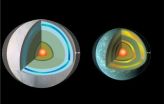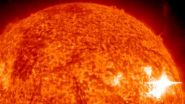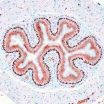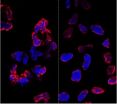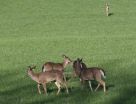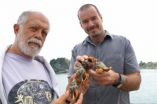(Press-News.org) A number of studies suggest that children delivered by Caesarean section have a different intestinal flora than children delivered by natural birth. But it is still unknown why this is the case and what it means for the immune system. Researchers from the Faculty of Health and Medical Sciences therefore decided to scrutinise the impact of birth on the development of the immune system in a study of newborn mouse pups.
The study shows that pups delivered by Caesarean section had developed a lower number of cells that strengthen the immune system, says Camilla Hartmann Friis Hansen, Assistant Professor at the Department of Veterinary Disease Biology. The findings have recently been published in Journal of Immunology.
Mother's bacteria may be important
Newborns delivered by natural birth are exposed to more bacteria from the mother than those delivered by Caesarean section. According to a research hypothesis called the hygiene hypothesis, the newborn baby's immune system in this way learns to distinguish between its own harmless molecules and foreign molecules. In the experiment, pups delivered by Caesarean section showed a lower number of cells of a type that plays an important role in preventing reactive immune cells from responding to molecules from the body itself, from the diet and from harmless intestinal bacteria. Autoimmune diseases such as type 1 diabetes, Chrohn's disease and allergy are precisely characterised by an over-reaction by the immune system.
The researchers then looked for signs of development of type 1 diabetes in pups delivered by Caesarean section, but found none. The next step is therefore to study whether the pups are predisposed to other autoimmune diseases and then to test the theses in clinical trials.
The experiments on mice may give us an idea of what would be interesting to study in more detail in clinical trials, so that in the long term, we may be able to develop methods for strengthening the immune system in newborns who are predisposed to autoimmune diseases, says Professor Axel Kornerup Hansen, Department of Veterinary Disease Biology.
INFORMATION:
Contact:
Professor Axel Kornerup Hansen.
akh@sund.ku.dk
Mobile: +45 30 66 34 86
Fact box: What is the cause of autoimmune diseases?
The immune system responds erroneously to harmless molecules from the body itself or from the diet.
Mouse study: Natural birth may strengthen the immune system
2014-07-10
ELSE PRESS RELEASES FROM THIS DATE:
Vasectomy may increase risk of aggressive prostate cancer
2014-07-09
Boston, MA -- Vasectomy was associated with a small increased risk of prostate cancer, and a stronger risk for advanced or lethal prostate cancer according to a new study from Harvard School of Public Health (HSPH). The researchers found that the association remained even among men who received regular PSA screening, suggesting the increased risk of lethal cancer cannot be explained by diagnostic bias. It is the largest and most comprehensive study to date to look at the link between vasectomy and prostate cancer.
The study appears online July 7, 2014 in Journal of Clinical ...
Bacteria found in bladders of healthy women differ from those in women with incontinence
2014-07-09
Bacteria found in the bladders of healthy women differ from bacteria in women with a common form of incontinence, according to researchers from Loyola University Chicago Stritch School of Medicine.
These findings, published July 9, 2014, in the American Society for Microbiology's online journal mBio, suggest that bacterial communities may play a role in female urinary health.
"Urgency urinary incontinence (UUI) is a common, yet poorly understood, condition with symptoms similar to urinary tract infections," said Alan Wolfe, PhD, co-investigator and professor of Microbiology ...
NASA finds friction from tides could help distant earths survive, and thrive
2014-07-09
As anybody who has started a campfire by rubbing sticks knows, friction generates heat. Now, computer modeling by NASA scientists shows that friction could be the key to survival for some distant Earth-sized planets traveling in dangerous orbits.
The findings are consistent with observations that Earth-sized planets appear to be very common in other star systems. Although heat can be a destructive force for some planets, the right amount of friction, and therefore heat, can be helpful and perhaps create conditions for habitability.
"We found some unexpected good news ...
NASA MESSENGER and STEREO measurements open new window into high-energy processes on the sun
2014-07-09
Understanding the sun from afar isn't easy. How do you figure out what powers solar flares – the intense bursts of radiation coming from the release of magnetic energy associated with sunspots – when you must rely on observing only the light and particles that make their way to near-Earth's orbit?
One answer: you get closer. NASA's MESSENGER spacecraft -- which orbits Mercury, and so is as close as 28 million miles from the sun versus Earth's 93 million miles -- is near enough to the sun to detect solar neutrons that are created in solar flares. The average lifetime for ...
New recreational travel model to help states stop firewood assisted insect travel
2014-07-09
RESEARCH TRIANGLE PARK, NC, July 9, 2014 – The spread of damaging invasive forest pests is only partially powered by the insects' own wings. People moving firewood for camping can hasten and widen the insects' spread and resulting forest destruction. A new U.S. Forest Service study gives state planners a tool for anticipating the most likely route of human-assisted spread they can use to enhance survey and public education efforts.
The study, "Using a Network Model to Assess Risk of Forest Pest Spread via Recreational Travel," was published July 9 in the journal PLOS ...
CNIO scientists discover that pluripotency factor NANOG is also active in adult organisms
2014-07-09
Scientists from the Spanish National Cancer Research Centre (CNIO) have discovered that NANOG, an essential gene for embryonic stem cells, also regulates cell division in stratified epithelia—those that form part of the epidermis of the skin or cover the oesophagus or the vagina—in adult organisms. According to the conclusions of the study, published in the journal Nature Communications, this factor could also play a role in the formation of tumours derived from stratified epithelia of the oesophagus and skin.
The pluripotency factor NANOG is active during just two days ...
No extra mutations in modified stem cells, study finds
2014-07-09
LA JOLLA-The ability to switch out one gene for another in a line of living stem cells has only crossed from science fiction to reality within this decade. As with any new technology, it brings with it both promise--the hope of fixing disease-causing genes in humans, for example--as well as questions and safety concerns. Now, Salk scientists have put one of those concerns to rest: using gene-editing techniques on stem cells doesn't increase the overall occurrence of mutations in the cells. The new results were published July 3 in the journal Cell Stem Cell.
"The ability ...
Hunting gives deer-damaged forests in state parks a shot at recovery
2014-07-09
WEST LAFAYETTE, Ind. - Regulated deer hunts in Indiana state parks have helped restore the health of forests suffering from decades of damage caused by overabundant populations of white-tailed deer, a Purdue study shows.
A research team led by Michael Jenkins, associate professor of forest ecology, found that a 17-year-long Indiana Department of Natural Resources policy of organizing hunts in state parks has successfully spurred the regrowth of native tree seedlings, herbs and wildflowers rendered scarce by browsing deer.
Jenkins said that while hunting may be unpopular ...
Protein pushes breast cancer cells to metastasize
2014-07-09
Using an innovative tool that captures heretofore hidden ways that cells are regulated, scientists at Rockefeller University have identified a protein that makes breast cancer cells more likely to metastasize.
What's more, the protein appears to trigger cancer's spread in part by blocking two other proteins that are normally linked to neurodegeneration, a finding that suggests these two disease processes could have unexpected ties.
The study, which appears in the July 10 issue of Nature, points to the possibility of new cancer therapies that target this "master regulator" ...
Not at home on the range
2014-07-09
As climate change shifts the geographic ranges in which animals can be found, concern mounts over the effect it has on their parasites. Does an increased range for a host mean new territory for its parasites as well?
Not necessarily, says a team of UC Santa Barbara scientists, including parasitologists Ryan Hechinger and Armand Kuris. In a study published in the Journal of Biogeography, Hechinger, Kuris and colleagues show that for some species, the opposite may happen: Hosts may actually lose their parasites when the hosts shift or increase their range. Theirs is one ...
